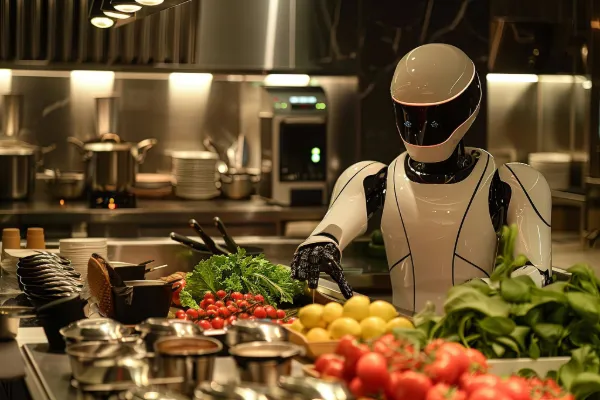
Enhancing Customer Engagement in Food Services with Chatbots: A Recipe for Success
Introduction
In the fast-paced world of food services, ensuring a smooth, efficient customer experience is crucial to success. With growing demands for quicker service, personalized orders, and seamless interactions, AI-powered chatbots are becoming a game-changer. These chatbots provide 24/7 support, streamline order processing, and enhance customer engagement, all while reducing the workload for staff.
From answering inquiries about menu options to managing reservations, AI chatbots have the potential to revolutionize how restaurants and food services interact with customers. In this post, we’ll explore how chatbots can improve customer engagement, automate routine tasks, and boost operational efficiency in the food service industry.
The Role of Chatbots in Improving Customer Engagement
Customer engagement is at the heart of the food service industry, and AI chatbots offer an innovative way to enhance customer interactions. Whether it’s answering frequently asked questions, providing personalized recommendations, or helping customers place orders, chatbots ensure that each interaction is smooth and efficient.
For example, a customer browsing a restaurant’s website or mobile app can interact with a chatbot to learn about the menu, check ingredient details, or find out if the restaurant caters to specific dietary requirements like vegan or gluten-free options. By offering instant responses to common questions, chatbots help customers make informed choices, enhancing their overall experience.
Personalized interaction is key to keeping customers engaged. Chatbots can remember previous orders or preferences, allowing them to suggest menu items that align with the customer’s tastes. This level of personalization creates a more tailored experience and increases customer loyalty over time.
Streamlining Order Management with AI Chatbots
One of the most impactful ways AI chatbots can improve food service operations is by streamlining order management. Chatbots can handle a high volume of customer orders, guiding users through the ordering process without requiring human intervention.
For instance, customers can place orders through the chatbot, customize their meals, and select delivery or pickup options. Chatbots can process payments, confirm orders, and send real-time updates on delivery or pickup status. By automating the ordering process, restaurants can speed up service, reduce errors, and improve overall customer satisfaction.
Moreover, chatbots can help restaurants handle peak hours by managing orders more efficiently and ensuring that customers receive timely responses. This reduces wait times and ensures that orders are accurately placed, even during busy periods.
Boosting Customer Loyalty with Chatbots
Loyalty programs are a crucial element in the food service industry, and AI chatbots can help drive customer loyalty by providing personalized rewards and promotions. For example, chatbots can notify returning customers about exclusive discounts, loyalty points, or new menu items based on their previous orders.
Additionally, chatbots can send follow-up messages to customers after they’ve dined or placed an order, asking for feedback or encouraging them to participate in loyalty programs. By maintaining ongoing engagement, chatbots help businesses strengthen their relationship with customers and encourage repeat visits.
Furthermore, chatbots can automate birthday promotions, sending personalized messages to customers with special offers on their birthdays. These targeted interactions make customers feel valued and incentivize them to return.
Providing 24/7 Customer Support
One of the biggest advantages of AI chatbots in food services is their ability to provide 24/7 support. Customers can interact with chatbots at any time, whether they need to check restaurant hours, place an order, or inquire about dietary options. This round-the-clock availability ensures that no customer inquiry is left unanswered, even when the restaurant is closed.
By offering instant responses to common inquiries such as menu availability or delivery options, chatbots reduce the workload for restaurant staff and improve the overall customer experience. Additionally, chatbots can manage routine tasks like confirming reservations or sending out reminders for upcoming bookings.
For food delivery services, chatbots can handle order tracking, sending real-time updates to customers on the status of their delivery. This proactive communication enhances customer satisfaction and minimizes the need for customers to contact support teams.
Automating Reservations and Table Management
AI chatbots can also assist with automating reservations and managing table bookings. Customers can interact with a chatbot to check table availability, make reservations, or modify existing bookings. By integrating with the restaurant’s reservation system, chatbots ensure that bookings are updated in real-time, reducing the risk of overbooking or scheduling errors.
In addition, chatbots can send reminders to customers about their reservations, ask about any special requests, and ensure that all guest preferences are noted before they arrive. This level of personalization and automation ensures that the restaurant operates smoothly, even during busy times.
For larger events or group bookings, chatbots can handle special requests such as seating arrangements or menu customization, streamlining the reservation process and improving overall operational efficiency.
Challenges of Implementing AI Chatbots in Food Services
While AI chatbots offer numerous benefits for the food service industry, there are some challenges that businesses must consider when implementing them. One of the key challenges is ensuring that the chatbot provides a natural and human-like interaction. Customers in the food service industry often expect personalized service, and chatbots must be designed to deliver a conversational and engaging experience.
Additionally, chatbots must be integrated with the restaurant’s existing systems, such as point-of-sale (POS) systems or reservation platforms, to ensure that orders and bookings are processed accurately. Without proper integration, there is a risk of discrepancies in order management or scheduling conflicts.
It’s also important to regularly update chatbot scripts based on customer feedback. Ensuring that the chatbot continues to meet customer expectations and provides accurate, up-to-date information is critical to long-term success.
The Future of AI Chatbots in Food Services
As AI technology continues to evolve, chatbots will play an even more significant role in the food service industry. In the future, chatbots could offer voice-activated ordering, allowing customers to place orders or make inquiries through voice commands, creating a more natural and convenient interaction.
Additionally, the integration of artificial intelligence with augmented reality (AR) could allow customers to view virtual menus or visualize dishes before placing their orders, enhancing the dining experience. This immersive interaction will set new standards for customer engagement in the food service industry.
Moreover, future AI chatbots may become even more adept at analyzing customer data to predict trends and make recommendations based on individual preferences. By staying ahead of these innovations, food service businesses can continue to improve customer satisfaction, streamline operations, and stay competitive in a rapidly changing market.
Conclusion
AI chatbots are transforming the food service industry by improving customer engagement, streamlining order management, and providing 24/7 support. From handling customer inquiries to managing reservations and processing orders, chatbots play a vital role in enhancing the customer experience while reducing the workload for staff.
As AI technology advances, chatbots will continue to provide innovative solutions for food service businesses, helping them improve operational efficiency, increase customer loyalty, and offer personalized dining experiences that keep customers coming back for more.
Related Reads on AI and Food Services:
Best Practices for Implementing AI Chatbots in Small Businesses
Learn how AI chatbots can help small businesses streamline operations and improve customer support, with insights that apply to the food service industry. Read more
How AI Chatbots Revolutionize Customer Service in Retail
Explore how AI chatbots in retail are improving customer satisfaction and streamlining operations, offering valuable lessons for food services. Read more
Chatbots for Real Estate: Improving Client Engagement and Streamlining Operations
Discover how AI chatbots can enhance client engagement and streamline operations, providing insights on how food services can benefit from similar automation. Read more
Expert Insights and Resources:
AI Chatbots: Revolutionizing Customer Engagement in Food Services
Discover how AI-powered chatbots are transforming the food service industry by providing 24/7 customer support, personalized menu recommendations, and streamlined ordering processes, leading to a 30% increase in customer satisfaction and a 25% boost in repeat orders. Read more
The Recipe for Success: Chatbots in Food Service Customer Engagement
Explore how chatbots are enhancing customer experiences in restaurants and food delivery services, from handling reservations to offering real-time order tracking, resulting in a 40% reduction in customer service costs and a 35% increase in customer retention rates. Read more
Serving Up Success: AI Chatbots in Food Service Customer Engagement
Learn how AI chatbots are revolutionizing customer engagement in the food service industry by offering personalized dining experiences, efficient order management, and instant query resolution, leading to a 20% increase in average order value and a 15% improvement in overall customer satisfaction scores. Read more
